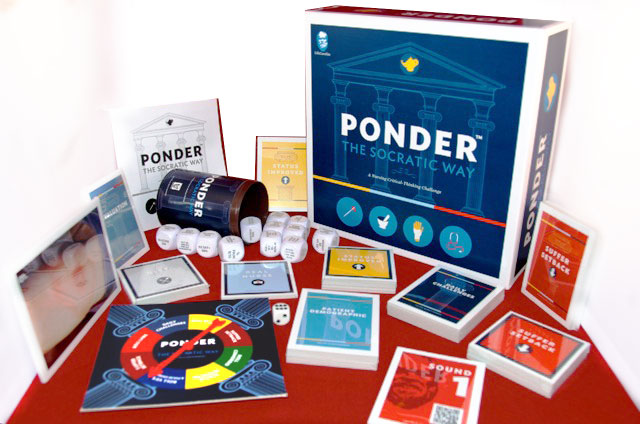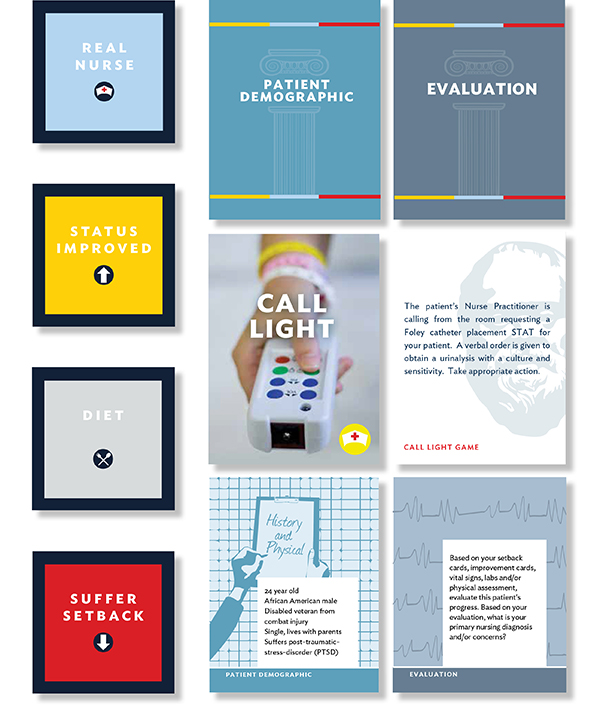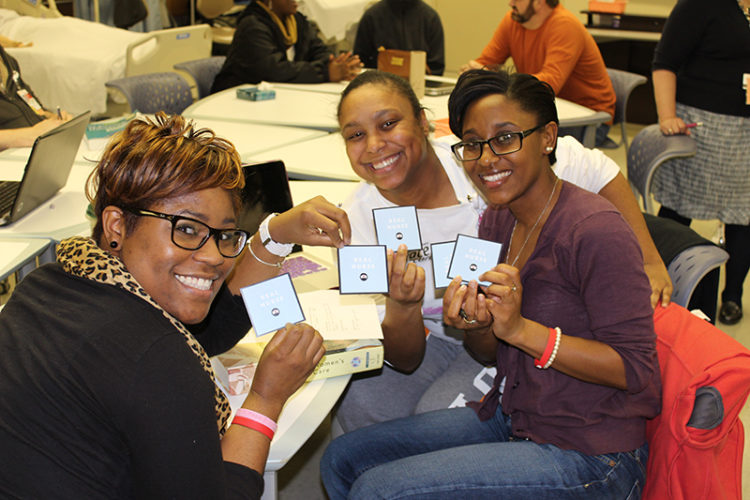Ponder: The Socratic Way from Mach2Pro on Vimeo.
Former UTHSC Instructor’s Startup Uses Games to Develop Critical Thinking Skills in Nursing Students
Dr. Hallie Bensinger never imagined that a classroom of bored students would set her down the path of entrepreneurship. An Advanced Practice Nurse, Dr. Bensinger worked at the University of Tennessee College of Nursing for almost ten years, most recently as Program Director for the Bachelor of Science in Nursing Program. As an instructor, she taught courses in Health Assessment and Maternal Child, as well as clinicals in Adult Health, Fundamentals, Leadership, and Community Health. It was in one of these classes where the idea for her game, Ponder: The Socratic Way, was born.
In 2010, Dr. Bensinger was leading a class through a series of case studies and could not help but notice how bored her students were with how the material was being presented. Inspired by a Jeopardy PowerPoint lecture she had given previously, she stopped by a school supply store to purchase play money to use for a similar lecture the following week. At the store, Dr. Bensinger happened across some dice that when rolled formed sentences. Thinking she could adapt this concept for her classroom, she bought some to take home.
Dr. Bensinger developed a prototype for Ponder: The Socratic Way over the weekend and the following week played the game with her class. In the game, students roll the dice and draw cards to create different patients and scenarios that change throughout game play. The instructor facilitates play by asking questions and encouraging students to think through situations. Dr. Bensinger’s students loved the game and her colleagues encouraged her to pursue a copyright. With funding and support from both the University of Tennessee Research Foundation (UTRF) and Launch Your City Memphis, Dr. Bensinger was able to develop a professional prototype, secure a copyright, and launch her startup, LifeCareSim.

“Supporting Dr. Bensinger’s desire to bring Ponder: The Socratic Way to market was a no-brainer,” said Lakita Cavin, J.D., Ph.D., Senior Staff Attorney with UTRF. “This game allows nursing school instructors to take their teaching to the next level, infusing real world scenarios and unpredictability into classroom lessons. This type of problem-based learning is a great facilitator of student learning and will undoubtedly help students develop practical skills that will be useful when they start practicing in their professions. This is the future of nursing education.”
Ponder: The Socratic Way fills a much needed niche in nursing education, bridging the gap between nursing school and the real world by simulating the type of critical thinking skills nurses must use every day such as assessment, diagnoses, planning, implementation, and evaluation, and allowing students to practice and hone those skills in a non-threatening environment.
Since its release, Ponder: The Socratic Way has received national recognition at conferences and from organizations, including the Sigma Theta Tau International Nursing Honor Society. Approximately 100 units of the game have been sold commercially to schools across the country. Related one happy customer: “We have Ponder and the students love it. We literally have to make them stop playing Ponder to focus on other things. They come in to class asking to play Ponder.”
 The game’s success led Dr. Bensinger to develop a booster pack with cards that emphasize pharmacology, nutrition, and oxygenation. She has also developed a complementary game, the Call Light Game, that combines Ponder: The Socratic Way’s spontaneity with low fidelity mannequins to simulate a real nursing floor. Looking ahead, Dr. Bensinger is already dreaming up additional nursing education games to offer through LifeCareSim, including games that address maternity, leadership, and health assessment.
The game’s success led Dr. Bensinger to develop a booster pack with cards that emphasize pharmacology, nutrition, and oxygenation. She has also developed a complementary game, the Call Light Game, that combines Ponder: The Socratic Way’s spontaneity with low fidelity mannequins to simulate a real nursing floor. Looking ahead, Dr. Bensinger is already dreaming up additional nursing education games to offer through LifeCareSim, including games that address maternity, leadership, and health assessment.
Dr. Bensinger is grateful for the support she received from her UT colleagues, who encouraged her to embark on her entrepreneurial journey, as well as UTRF for providing the resources she needed to secure a copyright and licensing agreement and introducing her to potential partners and investors.
“I hope my story inspires other nursing students who have an idea for a product or tool that could benefit the field,” said Dr. Bensinger. “If I could give one piece of advice to aspiring entrepreneurs, it would be to talk to as many people as possible. You never know when you will bump into that one person who will help you take your dream one step further.”
